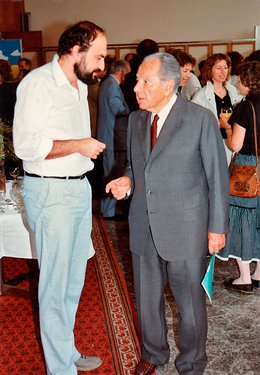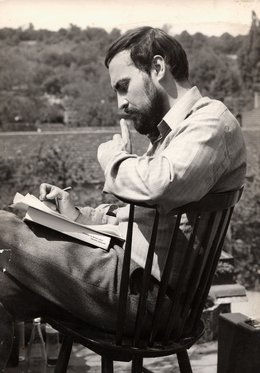(Extracts from Tomáš Halík’s book “Chci, abys byl”[I want you to be] , Prague 2012)
If we want to achieve a deeper understanding of the relationship between love and religion, and love and Christian belief, where should we direct our thoughts at this historical juncture? The word love – like the word God – is a typically polysemantic expression, it would be hard to find two other words in the language that mean such different things to different people. Love means self-transcendence. And what is more radical than to abandon self-absorption – which is particularly pronounced nowadays – in favour of an “absolute mystery” (i.e. God) and the disturbing and threatening alien environment of the world, which turns its hostile face to us (i.e. the enemy)? In my earlier reflections I reached the conclusion that faith (in the original biblical sense of the word) is not a matter of adopting specific opinions and “certainties”, but the courage to enter the domain of mystery: “Abraham went out, not knowing where he was going”.“ (Cf. Hebr.11, 8) It strikes me that the same applies to love (both love of God and love of one’s enemy): it is a risky endeavour whose outcome is never certain, a path on which we will never be sure where it is leading us. The expression “love of God” sounds just as absurd to many of those around us as the words “love of one’s enemy”. And after thirty-five years of pastoral ministry I venture to maintain that the sentence: “Love the Lord your God with all your heart and with all your soul and with all your mind and with all your strength,” (Deut 6.5) is also disconcerting for quite a number of believers. What does He specifically want of us? My books are not intended for those who are absolutely sure that they fully understand what is meant by the commandment to love God. They certainly already have their reward. I address myself to those who seek the meaning of those words, whether they consider themselves believers (of whatever denomination, because I am sure that in all churches and religious groupings there are those who regard their faith not as “a possession”, but as a method, an ongoing journey), almost-believers or “erstwhile believers” (who, in the course of their lives have lost their former religious certainties for one reason or another), doubters and agnostics, or non-believers (because in the multifarious world of “non-believers” there are always those who don’t consider their unbelief as a comfy bed at their life’s destination but are “people on a journey”). I address the people I meet around me every day who are “simul fideles et infideles”, believers and unbelievers at one and the same time#. In other words, they are by no means “religiously tone deaf”, but on their path of faith they know moments of God’s silence and their inner aridity; sometimes they lose their way and then find it again; they have unanswered questions and also experience moments of revolt. I address people who are obliged to call out again and again, like the man in the Gospel “I believe; help my unbelief!” Theologians are “professional doubters”. Even when they a fully anchored in God by sincere and ardent faith, it is their duty to be part of the band of seekers by exploring questions in the light of their own way of living, understanding and expressing their faith. A faith that is constantly unsettled by doubts and has to struggle with unbelief within oneself also is no “half-hearted faith”. In several of my books I deal with the dialogue between belief and unbelief, which I suggest is not a quarrel between two “warring parties”, but is something that takes place within many, many people. At the same time I try to demonstrate that belief (of a certain kind) and unbelief (of a certain kind) are two different interpretations, two views from different angles of the same mountain veiled in a cloud of mystery and silence. Time and again I have interpreted the unbelief of our epoch as a “collective dark night of the soul”, as the Good Friday moment of “the eclipse of God”, which non-believers may interpret as the “death of God” while believers regard it as the necessary passage to the Easter morning. In this book I am taking another step along this road. I show that the “disappearance of God” need not be simply a “dark night”. The commandment of love can lead to a mystical experience in which “God disappears” and “the ego disappears”, because love transcends the boundary between “subject” and “object” – and by locating God in a world that was strictly divided in the spirit of modern philosophy into “subjective” and “objective” spheres, the God of the Bible was fatally replaced by the banal god of modernity. That god fully deserved his rejection by atheists! A god that is “merely objective” or “merely subjective”, one that is only external or internal in relation to the world and people, is not worthy of belief or love. Linking the commandment to love God and commandment to love one another – the core of Jesus’ gospel – is a way of rediscovering the God who “disappeared”, and specifically, in our relationship to our neighbour. God happens where we love people, our neighbours. Jesus refuses to exclude anyone a priori from the category of “neighbour”, not even enemies. When asked who we should consider our neighbour, He inverts the question and tells us: Make everyone your neighbour. In the same way that linking the command to love God with the command to love one another overcomes the temptation to turn God into an object, an abstract idol, so also the command to love our enemies overcomes the similar temptation to turn humanity into an abstract idol. When we are asked who God is and who are our neighbours, we must not have a ready-made answer. We must go on seeking that answer all the time and experience how, in the process of searching, the horizon of possible answers continuously broadens. Those who break down the barrier between God and human beings, also break down the barriers between people, and refuse to accept as inalterable any division of people into “us and them”. I am convinced that the “second word” after the death of God, the return, which, according to the Gospels, started that Easter morning and will be accomplished at the end of time, is the discovery of love – love in the radical sense in which it is used in the Gospel: love as an unconditional and all-embracing force of unification with God and with all people, including our enemies. Jesus speaks about a love that fulfils people’s age-old yearning for perfection, to be like God: “be perfect, just as your heavenly Father is perfect”, “for he makes his sun rise on the bad and the good, and causes rain to fall on the just and the unjust.” (Cf. Matt. 5. 43-48) But this is quite a different understanding of love than the romantic notion of love as an emotion, which, even among Christians has dragged the word into the shallows of sentimentality. Love as it is understood in the Gospels has very little in common with romantic emotional turbulence. It is the courage to die to one’s selfishness, to forget oneself because of others, and to step out of oneself. Let us say it yet again: Love is essentially transcendence, crossing the borders that surround our existence: “this world”, the world of things. (In the words of Martin Buber# – it is a question of moving from the world of “it” to the world of “Thou”.) That is why love is fundamentally a religious and theological theme and that theme cannot be left solely to the mercy of literature, psychology and natural sciences, and at the same time it should not ignore how the theme of love can enriched from other perspectives. Besides, what else should Christian theology deal with if not love in the radical and profound sense that can only be perceived by eyes of faith! It is the duty of theology to reflect on love, even when it knows that in the end all its answers must fall silent: the silence of contemplation at the threshold of Mystery.
I can’t help thinking that God doesn’t particularly care whether we believe in Him or not. What really does matter to Him, however, is whether we love Him. Or more precisely: He doesn’t care about our faith in the sense that the term is often used, namely, that to believe in God is to be convinced of God’s existence. I don’t think our salvation depends on our religious opinions, notions and convictions. St Thomas Aquinas maintained long ago that we do not know what “being” means in the case of God, because God exists in a different way than things exist. What really matters to God and what he will presumably judge us by, are not our opinions, but the nature and degree of our love. He is not concerned with faith in the sense of “opinions”, but faith that is fundamentally associated with love. Faith without love is hollow; indeed it is often no more than a projection of our wishes and fears, and in that respect many atheist critics of religion are right. Faith without love is dead, like salt that has lost its taste: – “It is no longer good for anything but to be thrown out and trampled underfoot.” (Matt. 5.13) “Even the demons believe that and tremble,” scripture tells us. (James 2.19) In the very first sentences of his first encyclical, Pope Benedict XVI declared that being Christian is not the result of ethical choice or a lofty idea, but the loving encounter with a person. Christianity is not simply an ethical system or a system of catechistic sentences. It is – the pope says using other words – a “love story”. Becoming a Christian is not accepting some “world view”, but loving God. “Love the Lord your God with all your heart, with all your mind and with all your strength!” Jesus says when asked which was the greatest and most important commandment of the Law. But how is that done? My God, couldn’t you give me some specific instruction?
God cannot be the object of love because God is not an object; objective perception of God leads to idolatry. I cannot love God in the same way that I love another human being, my city, my parish or my work. God is not in front of me, just as light is not in front of me: I cannot see light, I can only see things in light. Likewise I cannot see and visualise God. Even faith does not “show” him (“No one has ever seen God,” the Bible declares resolutely). With faith all I can do is “see” the world “in God”.
Scripture tells us that “God is love”. Of course it is not easy to make love the object of one’s love. We love God by loving “in God”. We love people and the world “in Him”, in the same way that we see people and the world in the light. God is the fact that we love and how we love, rather than the “object” of our love. He is the “biosphere” of all real love. What is the difference between “loving in God” and simply experiencing “human love” without any religious consideration? Since scripture says “God is love” then we can certainly take it to have the same meaning as in the liturgical hymn of Holy Thursday Ubi caritas et amor, Deus ibi est – where there is real love, God is present. God happens where we love. Together with St Augustine and many teachers of the faith we can affirm: He is there even when we don’t recognise, acknowledge or name Him. However, if we truly are believers it means that we count on God – even when we “do not see Him” and “do not know Him”. Through our faith we are open to that mystery of absolute love. At that moment our love for people and the world is different than when our spiritual world is closed in that direction and is strictly limited to concerns of our “inner world”. Those who existentially “count on God” are freer in their love. Their love for the world and people is free of the anxiety and tension that derive from insistence. If our inner world is open to that dimension of reality that transcends all that is known and knowable, named and nameable, if it relates to “what eye has not seen, and ear has not heard, and what has not entered the human heart”,# then that faith truly gives us a certain detachment in regard to many things. In love that “detachment” does not take the form of coolness, but of greater purity. It is not detachment from those that we love, but detachment from our selfishness, which would seek to bind and own them.
Although the word faith appears more frequently in the New Testament than the word love, faith in that context does not mean “belief that God exists” but “belief in God’s love”. What makes a Christian is not the belief that “God exists”, but the belief that God is love.



